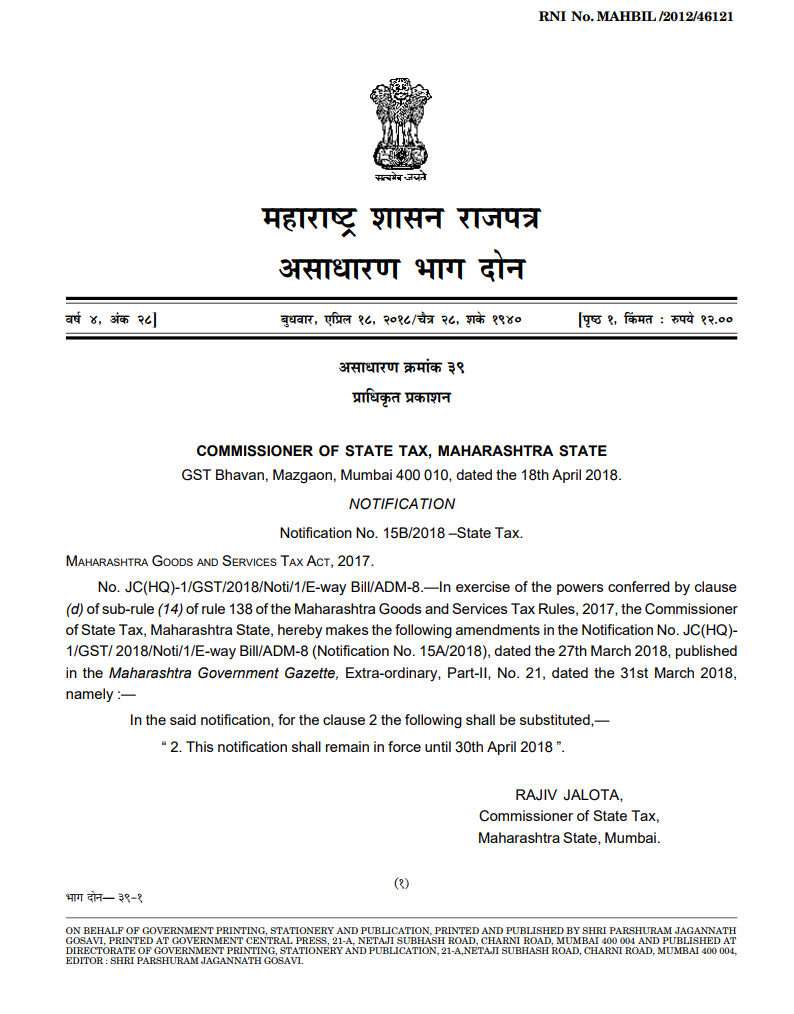Maintenance of books of accounts and necessary supporting and relevant records are highly essential requirements for proper management and control of the business operations. This will facilitate the correct receipt and payment of cash and other transactions entered by the company. It is mandatory to maintain the books of accounts under Indian Companies Act, 2013 and GST Act, 2017. Hence accounts maintenance in India is compulsory.
Under GST Act, 2017, as per section 35 of the CGST Act, 2017,
“Every registered person shall keep and maintain, at his principal place of business, as mentioned in the certificate of registration, a true and correct account of—
Production or manufacture of goods;
Inward and outward supply of goods or services or both;
Stock of goods;
Input tax credit availed;
Output tax payable and paid; and
Such other particulars as may be prescribed.”
Accordingly, a registered person under GST is require to maintain the records as mentioned in section 35 of the CGST Act, 2017.
However, a person may maintain additional records for decision making or for other useful information, such as:
Import/export of goods/services, if any;
Supplies attracting Reverse charge (from unregistered person or specified services/goods);
Advances received/paid and adjustments made;
Records for receipt of goods and services from registered person;
Details for Import of goods including bill of entry and other related documents;
Returns, payment challans, debit note and credit notes;
Financial statements;
Electronic records of tax liability , cash , credit ledger
Bank statements and pay-in slips;
Records for manner of computation of GST liability;
Records for availment and utilisation of credit;
GST reconciliation statement;
Electronic records of:-
tax liability
credit
cash;
Agreements;
Job work register;
Security Deposit Register.
Important Points to be Noted :
Where more than one place of business is specified in the certificate of registration then the accounts relating to each place of business shall be kept at such places of business;
The registered person may keep and maintain such accounts and other particulars in electronic form in prescribed manner;
Every owner or operator of warehouse or godown or any other place used for storage of goods and every transporter (irrespective of whether he is a registered person or not) shall maintain records of the consigner, consignee and other relevant details of the goods in the prescribed manner;
Every registered person whose turnover during a financial year exceeds the two crore rupees [Rule 80(3) of the CGST Rules, 2017] shall get his accounts audited by achartered accountant or a cost accountant and shall submit a copy of the audited annual accounts, the reconciliation statement and such other documents in prescribed form and manner;
Every registered person, other than a person paying tax under section 10, i.e., composition scheme, shall maintain the accounts of stock in respect of goods received and supplied by him, and such accounts shall contain particulars of the opening balance, receipt, supply, goods lost, stolen, destroyed, written off or disposed of by way of gift or free sample and the balance of stock including raw materials, finished goods, scrap and wastage thereof;
Every registered person is required to keep the particulars of the each and every supplier , recipient and the warehouses;
In case where goods found stored without any legal documents, then in this case proper office may determine the tax on such goods considering that the goods have been supplied by the registered person;
Any entry in registers, accounts and documents shall not be erased, effaced or overwritten, and all incorrect entries, otherwise than those of clerical nature, shall be scored out under attestation and thereafter the correct entry shall be recorded and where the registers and other documents are maintained electronically, a log of every entry edited or deleted shall be maintained;
Every registered person manufacturing goods shall maintain monthly production accounts showing quantitative details of raw materials or services used in the manufacture and quantitative details of the goods so manufactured including the waste and by products thereof
Every registered person supplying services shall maintain the accounts showing quantitative details of goods used in the provision of services, details of input services utilised and the services supplied;
Every registered person executing works contract shall keep separate accounts for works contract showing – (a) the names and addresses of the persons on whose behalf the works contract is executed; (b) description, value and quantity (wherever applicable) of goods or services received for the execution of works contract; (c) description, value and quantity (wherever applicable) of goods or services utilized in the execution of works contract; (d) the details of payment received in respect of each works contract; and (e) the names and addresses of suppliers from whom he received goods or services.
Recording of goods lost or stolen etc.
A person is required to record the details of goods lost, stolen, destroyed, written off or disposed of by way of gift or free samples properly in its books of accounts. In case where the registered person fails to account for the goods or services or both then the proper officer shall determine the amount of tax payable on the goods or services or both that are not accounted for, as if such goods or services or both had been supplied by such person and the provisions of section 73 (Determination of tax not paid or short paid or erroneously refunded or input tax credit wrongly availed or utilised for any reason other than fraud or any willful misstatement or suppression of facts) or section 74 (Determination of tax not paid or short paid or erroneously refunded or input tax credit wrongly availed or utilised by reason of fraud or any willful misstatement or suppression of facts), as the case may be, shall, mutatis mutandis, apply for determination of such tax.
Period of Retention of Accounts [Section 36 of the CGST Act, 2017]
Under GST, every registered person required to keep and maintain/retain books of account or other records until the expiry of 72 months from the due date of furnishing of annual return, i.e., 31st December for the year pertaining to such accounts and records.
It may be noted that a registered person, who is a party to an appeal or revision or any other proceedings before any Appellate Authority or Revisional Authority or Appellate Tribunal or court, whether filed by him or by the Commissioner, or is under investigation for an offence under Chapter XIX, shall retain the books of account and other records pertaining to the subject matter of such appeal or revision or proceedings or investigation for a period of 1 year after final disposal of such appeal or revision or proceedings or investigation, or for the period specified above, whichever is later.
Ledger Accounts to be maintained Under GST
The CGST and SGST will be charged on intra-state supplies whereas the IGST will be charged on all inter-state supplies. Therefore separate ledger account is required to be maintained related to CGST, SGST/UTGST, IGST and Compensation Cess.

